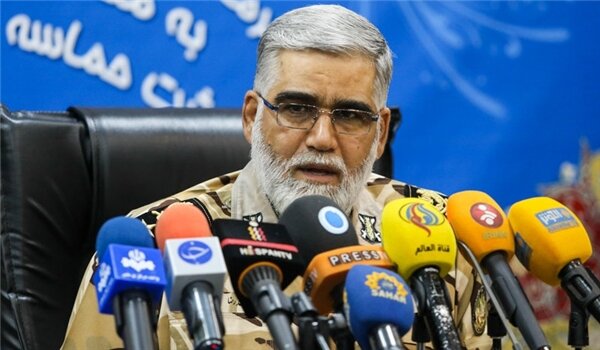U.S. attempt to form military coalition in Persian Gulf failed miserably: general

TEHRAN – Brigadier General Ahmadreza Pourdastan, head of the Iranian Army’s Strategic Studies, said on Saturday that that U.S. attempt to form a military coalition in the Persian Gulf has failed miserably.
Pointing to the small number of countries that have accepted the U.S. request to take part in its coalition, Pourdastan said the move failed even before it started, Fars reported.
“The Americans intend to form a coalition but when we review this issue, we see that except for one or two countries, other states have rejected to join the coalition,” he said.
The general underlined that all moves on the ground, air and sea as well as those in and outside borders are monitored and analyzed by the Iranian armed forces.
He added that Iran adopts necessary measures and makes preparations proportionate to those moves.
The United States has been trying to persuade its allies into an international coalition with the claimed aim of providing “security” for merchant shipping in the Strait of Hormuz — which accommodates around a third of global seaborne oil traffic — and other strategic Middle Eastern shipping lanes.
Washington’s call has, however, been met with little interest from its allies, which are concerned that joining such an alliance could drag them into a conflict with Iran.
Many European and Asian countries have, in one way or another, declined to join the alliance.
German Foreign Minister Heiko Maas on Monday said Berlin favored a European mission but warned it was rather difficult to make progress on the initiative.
“At the moment the Britons would rather join an American mission. We won’t do that,” said Maas.
On Wednesday, Iranian Defense Minister Brigadier General Amir Hatami, in separate phone talks with his Qatari, Omani and Kuwaiti counterparts, warned that the military coalition that the U.S. is attempting to form in the Persian Gulf will undermine regional security.
General Hatami also highlighted Iran’s continued efforts to maintain peace and security all over the Persian Gulf, the Sea of Oman and the Strait of Hormuz.
He stressed that the region’s security should be provided by the regional states, calling for a constructive dialogue among the neighboring countries to boost their cooperation regarding the matter.
Iranian Foreign Minister Mohammad Javad Zarif also condemned the attempts, stressing that the presence of trans-regional military forces in the strategic region would act as a “source of insecurity.”
Washington claims Tehran has played a role in two separate attacks on oil tankers in the Sea of Oman in May and June, without providing any credible evidence to support the accusations.
Iran has categorically rejected the charges.
Tensions have been running high between Iran and the U.S. since Washington’s decision in May last year to abandon the 2015 Iran nuclear deal and reimpose sanctions on Tehran as part of a “maximum pressure” campaign.
The tensions hit a new high after Iran shot down a U.S. spy drone on June 20, following its violation of Iranian airspace. Iran has warned Washington that it wouldn’t hesitate to shoot down more drones.
MH/PA
Leave a Comment